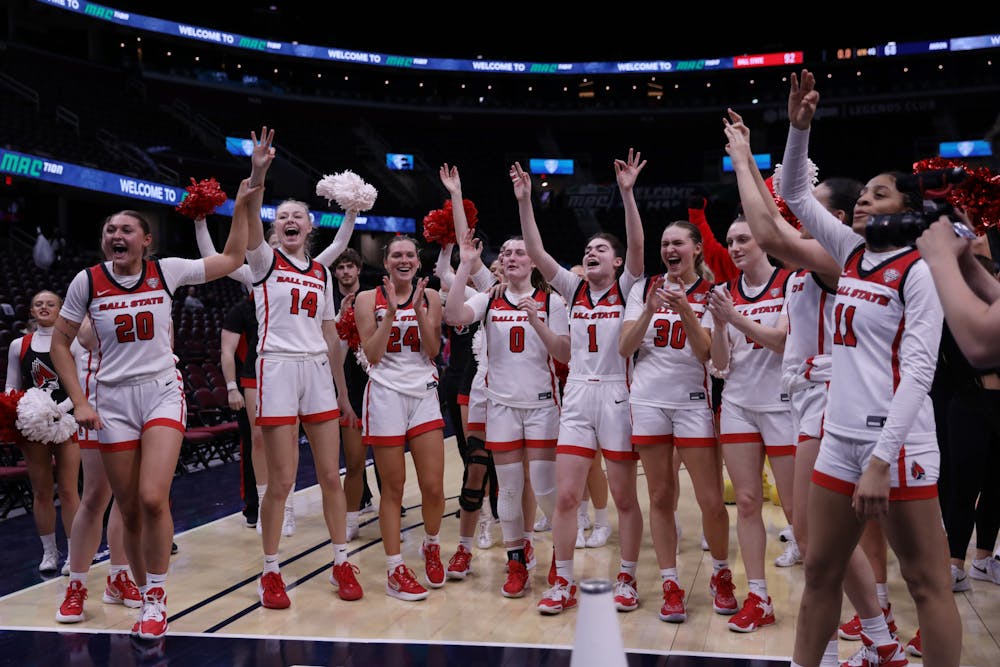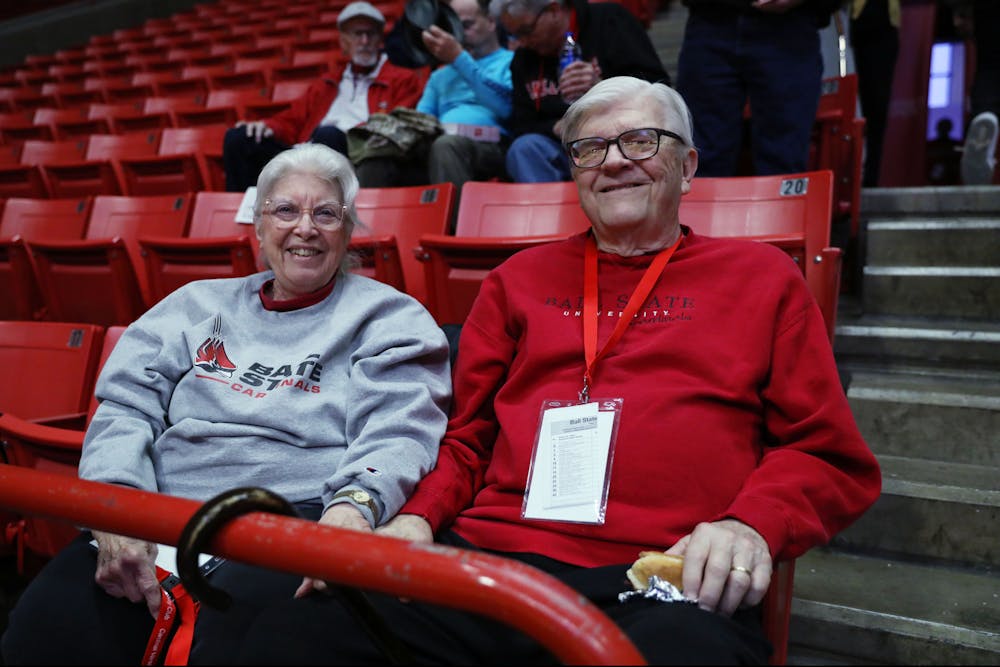The scent of popcorn weighs the air as Carol Casazza, a long-term season ticket holder, scurries down a hall to get to her seat inside Worthen Arena.
She and her husband Clarence have held season tickets since 1970 for football, men’s basketball and now, women’s basketball.
Before finding her seat, she walks down the hall toward the court, a curtain separating her from the roar of the crowd, the breakaway dunk, a clutch three-pointer, a buzzer-beater, a great win or a tough loss.
“As you come through the curtain, it's fun to come out and hear the roar of the crowd,” Casazza said. “It is kind of like being on the team, I guess it is how [the players] come out onto the floor with the crowd cheering for them. When we come down the hallway, they're not cheering for us, but you kind of get into the feeling of a big crowd and a lot of fans supporting the same team and that's kind of exciting.”
There are roughly 4,000 season ticket holders for men’s and women’s basketball and football at Ball State, Matt Brown, assistant AD for ticket services and revenue generation, said. Each one has a story of what makes Ball State athletics special to them.
But five of the 4,000 have been coming to games longer than most. John Starnes, Ken and Peggy Briner, and Carol and Clarence Casazza have a combined 160 years of rooting for their Cardinals. For them, Ball State is not just a place where they watch sporting events; it’s a place that sets the rhythm for the seasons of their lives.
Starnes came to Muncie as a student and graduated from Ball State in 1965, eventually working at Ball State for 45 years. Starnes has had football and men’s basketball season tickets since 1967.
“It's very special to me, the fact that it [Ball State] basically fed my family and gave me a lot of opportunities to meet a lot of great people,” John Starnes said.
Until his retirement 12 years ago, Starnes worked in the financial aid office for the majority of his time here at Ball State.
Ken Briner graduated from Ball State in 1969. After graduating, Ken served two years in the Army.
Ken and Peggy Briner have had season tickets to football since 1972 and believe they’ve had men’s basketball season tickets for about 36-37 years.

The Casazza family came to Ball State in 1966, Clarence was working at Miami University in Ohio. After finishing his master’s degree at Miami, he came to Ball State to work in financial aid. Carol worked in the Dean of Students Office where she worked with processing withdrawing students. She also worked to support students who needed financial help.
Women’s Basketball head coach Brady Sallee had nothing but praise for the season ticket holders who support the team year in and year out.
“It's your fan base,” Sallee said. “It's the ones you can count on week in and week out to be there in good times and bad. They are the ones that live and die every win with you, they live and die every loss with you. Clearly, if you can build that base, bigger and bigger year after year, you start putting bigger crowds in here, but they're everything to your program.”
Sallee said he feels like the fan base for the Cardinals has been tried and true from the time he got there. He said those who have been there since the start might not know how much they truly mean to himself and the team.
After all these years, Starnes remembers his very first Ball State sporting event.
“I can remember the first basketball game I went to,” Starnes said. “We were playing Hanover, and their star player was a guy from my high school. I went to Ben Davis High School. He played for Hanover, and so I went to the game. I ended up rooting for Hanover because I thought that the officials were so one-sided to Ball State that it kind of upset me, so I was rooting for Hanover in that game. I think that's the last time I ever rooted against Ball State.”
Starnes has been going to Scheumann Stadium when it first opened up in 1967, even getting the score correct from the inaugural game at the stadium.
“I certainly remember the first game that we played in the stadium; we played against Butler,” Starnes said. “We used to get beat all the time by Butler and then of course, we upgraded our program, and when we played Butler in that first game in the stadium. I think we beat them something like 65-7. So last time we played Butler, they didn't want to play us anymore.”
Ken’s earliest game that came to mind was the Grantland Rice Bowl in 1967. Briner remembers driving down to Murfreesboro, Tennessee, for that game.
The Briners have a schedule they stick to for home games.
“We sit on the floor, and we like to watch the warm-ups,” Peggy said. “We always talk to David Eha [a color analyst] and some of the other people that work there. We have different ushers and things. We don't know their name or anything, but we talked to them on our way in and have different people that we talk to, so it's just an enjoyable time for us.”
Clarence is a personal fan of the local players coming to Ball State.
“Ray McCallum, being a local kid here in town and because he played Ball State and then went on to coach, it was always fun to watch Ray,” Clarence said. “Bonzi Wells was an exciting player, he played here at Ball State. I always enjoy watching the local kids when they're playing.”
The Briners were part of a program called Cardinal Cooks, allowing them to get to know players personally.
Cardinal Cooks was a program where members of the Cardinal Varsity Club would sign up and have football players go to their houses to have a home-cooked meal. The Briners would get about eight to 10 student-athletes coming to their house twice a year for a meal.
“Basketball, as well as football, started doing it, and then that's when COVID[-19] came along, so it stopped, and so we hadn't any recently, but we just got to know hundreds and hundreds of athletes,” Clarence said.

Starnes said he has only missed three or four games since 1967, and two of those were because he was attending his daughter’s weddings. His oldest daughter was remarried this past October, the day Ball State was able to come back against NIU and win in double-overtime.
Starnes was listening to the game after the wedding when they were waiting for the reception. He also said there were other Ball State fans in the audience keeping him posted on what was going on.
Starnes was set to pray just before the reception, and of course, he started with how any season ticket holder would.
“I just want everyone to know Ball State just won in double-overtime in football,” Starnes said.
Clarence compared the Cardinal Varsity Club to a social event. After going to games for so long, he said he has gotten to know a lot of people, so watching a game and catching up with others is nice. Carol added that when sports are over, they look forward to the next season coming up.

The Ball State women's basketball team celebrates a win in a game against Akron in the MAC Tournament Quarterfinals March 8 at Rocket Mortgage Fieldhouse in Cleveland. Amber Pietz, DN
The Briners go to every single game, home and away, for men’s basketball and football.
As far as their favorite place to go in the MAC, it would be nowhere because Ken said they don’t like most of them teamwise. But if there was a place they liked to go the most, he said it would either be Miami of Ohio for the shorter drive or Toledo, Ohio, because there is such a tense rivalry.
Since the Briners travel so much, Peggy talked about a favorite restaurant, when they travel to Northern Illinois, in DeKalb, Illinois, called Yen Ching. She said that most of the employees know them when they visit.
The fans were united in their excitement about men’s basketball head coach Michael Lewis, who Starnes and the Casazzas said has created more excitement in the games.
“I think [men’s basketball head coach] Michael Lewis has kind of generated some excitement,” Starnes said. “We still have 5-6,000 in our arena and hold 11 [thousand]. Then, when you look at some of the other MAC schools and when we're playing a road game, they're lucky to have 1,000 people. Even though it is not great, it is better than other schools.”
Although Starnes can be seen in the stands away from players and coaches, he also has a good relationship with the Ball State Women’s head basketball coach Brady Sallee.
Starnes' granddaughter is roommates and good friends with Sallee’s daughter, so he said Sallee has almost been a second father to her over the years.
Sallee said the Starnes family had a great impact on his family when they first arrived here at Ball State.
“He's been all in from the moment I got here and supported our program,” Sallee said. “He hardly misses any Ball State games but hardly misses any of ours. I always know where he’s sitting, and he's always been nothing but supportive.”
Ball State is just not a university to these long-term season ticket holders. It is connecting with players, being with friends, supporting a team and a place where some have worked. A second home.
Contact Elijah Poe with comments at elijah.poe@bsu.edu or on Twitter @ElijahPoe4.





